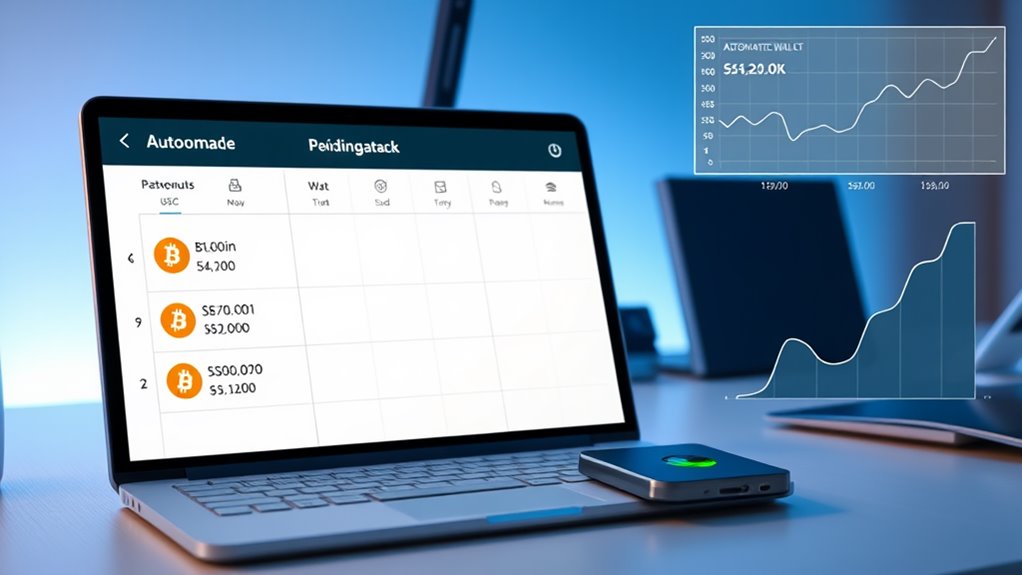Recurring Payments in Cryptocurrency
Note: This post may contain affiliate links, and we may earn a commission (with No additional cost for you) if you purchase via our link. See our disclosure for more info. The gold and crypto world is constantly changing. This is not financial, investment, legal, or professional advice. So, please verify the information on the gold and cryptocurrency provider’s websites.
Recurring payments in cryptocurrency are shaking things up. Forget banks – it's all about smart contracts now. They automate payments, saving you from missing due dates while making transactions cheaper. Stablecoins lessen the drama of price swings, but good luck with cancellations. You'll need to set up a wallet and navigate a complicated implementation process, too. Want to know more about the platforms making this possible? Stick around; there's plenty to unpack.

In a world where everyone's tired of waiting for bank approvals and dealing with pesky middlemen, recurring payments in cryptocurrency burst onto the scene like a revitalizing change. Automated transactions, scheduled to occur at regular intervals—daily, weekly, or monthly—allow users to send Bitcoin or stablecoins without the usual headaches. Utilizing smart contracts means you can forget about permissions and intermediaries, making payments seamless. Blockchain transparency provides an immutable record, making audits as easy as pie. But hold on, you need wallet integration for fund management. That's the price of admission.
The benefits? Oh, they're pretty tempting. Decentralized control lets people sidestep traditional banking systems, which is a lifesaver in regions with shaky financial infrastructures. And let's not forget the cost efficiency—lower transaction fees, like 0.5% through Inqud, make those old-school payment processors look like a joke. Additionally, the automation of transactions reduces the risk of missed payments and avoids the hassle of manual wallet logging. Moreover, recurring payments enhance convenience for both businesses and customers by streamlining billing processes.
Global accessibility means no geographic restrictions, making international subscriptions a breeze. Plus, with no chargebacks, merchants can finally breathe easy. Programmable payment schedules? Yes, please! Smart contracts let users customize their terms, making this an attractive option. For more stable recurring payments, options like USD Coin offer regulatory compliance and transparent reserves, reducing volatility concerns.
But it's not all rainbows and sunshine. There's volatility risk, particularly with non-stablecoin cryptocurrencies. Price fluctuations can turn budgeting into a nightmare.
Plus, user-initiated payments make it a bit more complex than traditional pull-based systems. Tracking cancellations? Good luck with that, thanks to crypto's anonymity. Need to adjust a smart contract? Get ready to create a new one, adding to your operational headaches.
And don't even get started on regulatory uncertainty—laws are changing faster than you can say “blockchain.”
Platforms like UPay and Binance are making waves, but the implementation process isn't just plug-and-play. Users need to select services, generate invoices, and integrate their wallets. Testing is a must.
It's a whole new world, full of potential and pitfalls, waiting to be explored.
Frequently Asked Questions
How Can I Cancel a Recurring Payment in Cryptocurrency?
Cancelling a recurring payment can feel like maneuvering through a maze with no exit. It's frustrating!
First, check where you signed up. Payment providers, like PayPal, usually have cancellation options.
If you're using specific platforms, they all have their little quirks. Just don't forget to peek into your bank or crypto wallet too.
Sometimes, it's like playing hide-and-seek with money. So, good luck, because you might need it!
Are There Fees Associated With Recurring Cryptocurrency Payments?
When it comes to fees, oh boy, they can pile up.
Different platforms have their own rules. For instance, Calypso Pay hits you with a flat 1% per transaction.
Onchainpay? They have a sneaky commission that activates when payments arrive. It's like a surprise party, but not the fun kind.
What Cryptocurrencies Support Recurring Payment Features?
Cryptocurrencies are gaining traction, and some are ready for recurring payments. Bitcoin, Ethereum, TRON, BNB, and MATIC are the big players here. They support various payment setups, each with its quirks.
And don't forget stablecoins like USDT and USDC, which help keep values steady—because nobody wants their rent due in a volatile currency, right?
Finally, wallets like Metamask and Trust Wallet keep these transactions smooth. Simple, right?
Is My Payment Information Secure With Recurring Cryptocurrency Payments?
Is payment information secure? Well, it's complicated.
Blockchain tech is pretty slick. It's decentralized and tough to tamper with. Encryption? It's like a digital fortress against fraudsters.
But here's the kicker: while crypto wallets keep your assets close to home, they can still be hacked if you're careless.
And let's not forget, with smart contracts, you might feel a tad more secure, but nothing's foolproof.
Just a heads up: nothing's 100% safe.
Can I Set Different Amounts for Recurring Cryptocurrency Payments?
Can you set different amounts for recurring payments? Yes, but it's not as simple as flipping a switch.
Most platforms let users tweak payment amounts, but there's a catch. If you want to change it, you may need to explore settings or even create new invoices.
It's not a walk in the park. So, while flexibility exists, prepare for a bit of legwork. Welcome to the world of payments!












